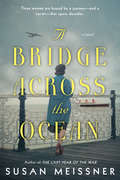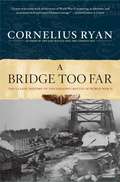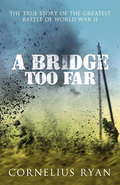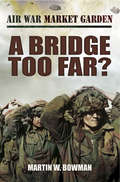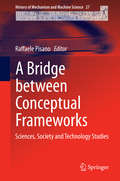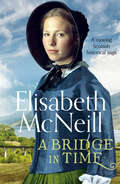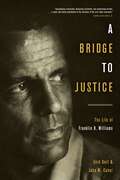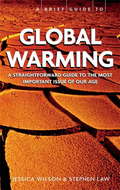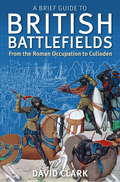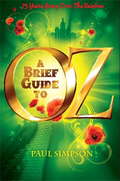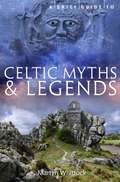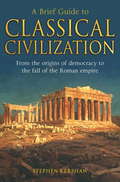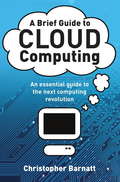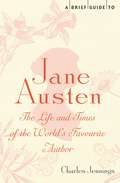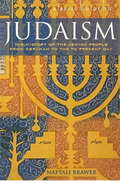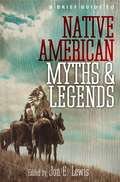- Table View
- List View
A Bridge Across the Ocean
by Susan MeissnerWartime intrigue spans the lives of three women—past and present—in the latest novel from the acclaimed author of Secrets of a Charmed Life. February, 1946. World War Two is over, but the recovery from the most intimate of its horrors has only just begun for Annaliese Lange, a German ballerina desperate to escape her past, and Simone Deveraux, the wronged daughter of a French Résistance spy. Now the two women are joining hundreds of other European war brides aboard the renowned RMS Queen Mary to cross the Atlantic and be reunited with their American husbands. Their new lives in the United States brightly beckon until their tightly-held secrets are laid bare in their shared stateroom. When the voyage ends at New York Harbor, only one of them will disembark... Present day. Facing a crossroads in her own life, Brette Caslake visits the famously haunted Queen Mary at the request of an old friend. What she finds will set her on a course to solve a seventy-year-old tragedy that will draw her into the heartaches and triumphs of the courageous war brides—and will ultimately lead her to reconsider what she has to sacrifice to achieve her own deepest longings. CONVERSATION GUIDE INCLUDED
A Bridge Too Far: The Classic History of the Greatest Battle of World War II
by Cornelius RyanThe classic account of one of the most dramatic battles of World War II.A Bridge Too Far is Cornelius Ryan's masterly chronicle of the Battle of Arnhem, which marshalled the greatest armada of troop-carrying aircraft ever assembled and cost the Allies nearly twice as many casualties as D-Day. In this compelling work of history, Ryan narrates the Allied effort to end the war in Europe in 1944 by dropping the combined airborne forces of the American and British armies behind German lines to capture the crucial bridge across the Rhine at Arnhem. Focusing on a vast cast of characters—from Dutch civilians to British and American strategists to common soldiers and commanders—Ryan brings to life one of the most daring and ill-fated operations of the war. A Bridge Too Far superbly recreates the terror and suspense, the heroism and tragedy of this epic operation, which ended in bitter defeat for the Allies.
A Bridge Too Far: The true story of the Battle of Arnhem
by Cornelius RyanArnhem 1944: the airborne strike for the bridges over the Rhine.The true story of the greatest battle of World War II and the basis of the 1977 film of the same name, directed by Richard Attenborough.The Battle of Arnhem, one of the most dramatic battles of World War II, was as daring as it was ill-fated. It cost the Allies nearly twice as many casualties as D-Day. This is the whole compelling story, told through the vast cast of characters involved. From Dutch civilians to British and American strategists, its scope and ambition is unparalleled, superbly recreating the terror and suspense, the heroism and tragedy of this epic operation.'I know of no other work of literature of World War II as moving, as awesome and as accurate in its portrayal of human courage.' - General James A Gavin
A Bridge Too Far?: Volume 4 (Air War Market Garden #4)
by Martin W. BowmanThis, the fourth and final volume of the series on Market-Garden in September 1944 reveals the final fate of the troops at Oosterbeek and the decision to evacuate all able bodied men in Operation 'Berlin' as well as the subsequent Operation 'Pegasus' when the Allies tried to return as many beleaguered troops back to Allied lines as possible. Was Arnhem indeed 'a bridge Too Far'? While 'Market-Garden' certainly was a heroic failure conducted at great cost it is debatable whether it contributed materially to the ultimate victory or was a foolish sacrifice of thousands of troops, aircrew and Dutch civilians in an ill-conceived assault on the German-held bridges across the Lower Rhine. There is no doubting the gritty, gallant and valorous contribution on the part of the British, Dominion, American and Polish paratroopers, the RAF and USAAF aircrews and their German opponents and Dutch civilians. Their incredible, illuminating and often under-stated accounts of extraordinary courage, camaraderie, shared terror and encounters with the enemy offer a more personalised view of 'Market-Garden' through the words of those who were there at the heart of the action. These tales are complemented by the author's background information supplemented by the inclusion of daily timelines that give an overall picture of each battle and air operation.
A Bridge between Conceptual Frameworks: Sciences, Society and Technology Studies (History of Mechanism and Machine Science #27)
by Raffaele PisanoThis book analyzes scientific problems within the history of physics, engineering, chemistry, astronomy and medicine, correlated with technological applications in the social context. When and how is tension between disciplines explicitly practised? What is the conceptual bridge between science researches and the organization of technological researches in the development of industrial applications? The authors explain various ways in which the sciences allowed advanced modelling on the one hand, and the development of new technological ideas on the other hand. An emphasis on the role played by mechanisms, production methods and instruments bestows a benefit on historical and scientific discourse: theories, institutions, universities, schools for engineers, social implications as well. Scholars from different traditions discuss the emergency style of thinking in methodology and, in theoretical perspective, aim to gather and re-evaluate the current thinking on this subject. It brings together contributions from leading experts in the field, and gives much-needed insight into the subject from a historical point of view. The volume composition makes for absorbing reading for historians, philosophers and scientists.
A Bridge for Judith
by Clarissa RossIf she helped him with his business, she'd lose him to another woman . . .Judith Barnes had loved and lost when her fiance, Miles Estey, suddenly left town under a cloud of suspected embezzlement. Putting that behind her, Judith became the private secretary to her former childhood sweetheart, Alan Fraser, now a handsome attorney and head of the city's bridge authority.Judith felt herself recapturing the deep feelings she had had for Alan years ago. Then, the same unscrupulous and political bosses who had driven Miles from her life suddenly threatened to do the same with Alan . . . unless a beautiful, flamboyant society girl beats them to it. Could Judith win the man she still loves, against such overwhelming odds?Sensuality Level: Behind Closed Doors
A Bridge for Judith
by Clarissa RossIf she helped him with his business, she’d lose him to another woman . . .Judith Barnes had loved and lost when her fiance, Miles Estey, suddenly left town under a cloud of suspected embezzlement. Putting that behind her, Judith became the private secretary to her former childhood sweetheart, Alan Fraser, now a handsome attorney and head of the city’s bridge authority.Judith felt herself recapturing the deep feelings she had had for Alan years ago. Then, the same unscrupulous and political bosses who had driven Miles from her life suddenly threatened to do the same with Alan . . . unless a beautiful, flamboyant society girl beats them to it. Could Judith win the man she still loves, against such overwhelming odds?Sensuality Level: Behind Closed Doors
A Bridge for Judith
by Clarissa RossIf she helped him with his business, she’d lose him to another woman . . .Judith Barnes had loved and lost when her fiance, Miles Estey, suddenly left town under a cloud of suspected embezzlement. Putting that behind her, Judith became the private secretary to her former childhood sweetheart, Alan Fraser, now a handsome attorney and head of the city’s bridge authority.Judith felt herself recapturing the deep feelings she had had for Alan years ago. Then, the same unscrupulous and political bosses who had driven Miles from her life suddenly threatened to do the same with Alan . . . unless a beautiful, flamboyant society girl beats them to it. Could Judith win the man she still loves, against such overwhelming odds?Sensuality Level: Behind Closed Doors
A Bridge in Time
by Elisabeth McNeillChange is coming to the people of the oldest village in Scotland in this dramatic and riveting saga of survival from the author of Wild Heritage. For generations, Camptounfoot has remained little changed but now it is 1853 and the railway is coming . . . Shy and beautiful Emma Jane Wylie is determined to fight for the realization of her father&’s dream—the construction of the railway bridge that will carry the new track southwards. Her father&’s demise puts Emma in charge. But during the two years of its construction, the project is beset by drama and tragedy: cholera rages, the men down tools, murder and conspiracy are in the air—and then a landslide threatens to destroy all their endeavors. Inspired by her father&’s vision, and with a strength of mind and resolve at odds with her Victorian upbringing, Emma Jane takes on the world—and is determined to win.
A Bridge to Justice: The Life of Franklin H. Williams
by Enid Gort John CaherDocuments the life of a gifted African American leader whose contributions were pivotal to the movement for social justice and racial equalityFranklin Hall Williams was a visionary and trailblazer who devoted his life to the pursuit of civil rights—not through acrimony and violence and hatred but through reason and example. A Bridge to Justice sheds new light on this practical, pragmatic bridge-builder and brilliant, complex individual whose life reflected the opportunities and constraints of an intellectually elite Black man in the twentieth century.Franklin H. Williams was considered a “bridge” figure, someone whose position outside the limelight allowed him to navigate both Black and white circles, span the more turbulent racial waters below, and persuade people to see the world in a new way. During his prolific lifetime, he was a civil rights leader, lawyer, diplomat, organizer of the Peace Corps, United Nations representative, foundation president, and associate of Thurgood Marshall on some of the seminal civil liberties cases of the past hundred years, though their relationship was so fraught with tension that Marshall had Williams sent to California. He worked in the Kennedy and Johnson administrations, served as a diplomat, and became an exceptionally persuasive advocate for civil rights. Even after enduring the segregated Army, suffering cruel discrimination, and barely escaping a murderous lynch mob eager to make him pay for zealously representing three innocent Black men falsely accused of rape, Franklin was not a hater. He believed that Americans, in general, were good people who were open to reason and, in their hearts, sympathetic to fairness and justice.Dr. Enid Gort, an anthropologist and Africanist who conducted hundreds of hours of exclusive interviews with Williams, his family, friends, colleagues, and compatriots, and John M. Caher, a professional writer and legal journalist, have co-written an exhaustively researched and scrupulously documented account of this civil rights champion’s life and impact. His story is an object lesson to help this nation heal and advance through unity rather than tribalism.
A Brief Biography of Bhaktilaxmi Desai and Manibahen Patel
by Divya Joshi Manu RavalIt was suggested that biographies of Bhaktilaxmi Desai and Manibahen Patel may be published together as a single volume because these two noble ladies from Gujarat sacrificed so much of their personal life in the cause of Indian independence. They were the leading women freedom fighters in Gujarat who played a vital role in awakening the patriotic spirit of women during the Bardoli Satyagraha and other freedom struggles. In their lifetime, they spent a total of almost five years each as political prisoners, perhaps the longest among the women satyagrahis from Gujarat, if not of the whole country. We felt that these two biographies in one volume may be good companion reading. i Bhaktilaxmi was the daughter of a ‘Dewan’ of Limbadi, a princely state in Kathiawad. After her marriage to Darbar Gopaldas Desai, she became a princess in her own right. Bhaktilaxmi Desai, popularly called Bhaktiba was a Trustee and later President of the Vallabh Kanya Kelavani Mandal, an educational institution for girls run on Gandhian principles of ‘Nai Talim’. Darbar Gopaldas and Bhaktiba had started a similar school in the city of Nadiad after they came under the influence of Mahatma Gandhi and his Nai Talim. i The second narrative is a bird’s eye-view of Manibahen Patel’s life and times. Manibahen—the daughter of Sardar Vallabhbhai Patel—came in close contact with Gandhiji, Kasturba and most of the top leaders of her time because of her father’s close association with Gandhiji. She participated in all the Satyagrahas called for by Gandhiji and spent time in jails along with most of the prominent women leaders of her time, including Bhaktilaxmi Desai.
A Brief Guide - Global Warming
by Stephen Law Jessica WilsonIt now seems certain that our planet is warming. Is it the result of human activity and if so how do we combat it? This reasoned and reasonable guide helps to clarify the controversial issues and the way forward.An accessible guide to climate change that not only gives reasonable answers to the big questions surrounding the issue, but also takes us inside the corridors of power and the basements of the United Nations, where countries are engaged in a game of climate-change poker. For the individual, wondering whether to sell their seaside property or invest in a small wind-farm, this book offers sensible answers. It gives us the best and worst case scenarios and sets out how we can each address this contentious but vital issue.
A Brief Guide To British Battlefields: From the Roman Occupation to Culloden
by David ClarkA very readable work of reference offering a survey in chronological order, from AD 84 to 1746, of the major battles which have taken place on British soil, from the Roman occupation to Culloden, the last battle fought on British soil. In this way, the book can be read as a continuous narrative, while each entry also stands alone as a self-contained guide. The battles are grouped into relevant sections (such as the Wars of the Roses, the English Civil Wars and the Jacobite Rebellions), within broader historical periods. Each period is prefaced by a presentation of the nature of warfare and is enhanced by a feature article of specialist interest. Every entry includes a narrative of events leading up to the battle, a vivid description of the battle itself and an assessment of the long and short-term, consequences. In addition, there is useful information for visits, including precise identification of the location, details of access to and features of each site. The book is illustrated throughout with maps and a plate section.
A Brief Guide To British Battlefields: From the Roman Occupation to Culloden (Brief Histories)
by David ClarkA very readable work of reference offering a survey in chronological order, from AD 84 to 1746, of the major battles which have taken place on British soil, from the Roman occupation to Culloden, the last battle fought on British soil. In this way, the book can be read as a continuous narrative, while each entry also stands alone as a self-contained guide. The battles are grouped into relevant sections (such as the Wars of the Roses, the English Civil Wars and the Jacobite Rebellions), within broader historical periods. Each period is prefaced by a presentation of the nature of warfare and is enhanced by a feature article of specialist interest. Every entry includes a narrative of events leading up to the battle, a vivid description of the battle itself and an assessment of the long and short-term, consequences. In addition, there is useful information for visits, including precise identification of the location, details of access to and features of each site. The book is illustrated throughout with maps and a plate section.
A Brief Guide To OZ: 75 Years Going Over The Rainbow (Brief Histories)
by Paul SimpsonWhat if Dorothy Gale wasn't the only person who went to see the Wizard of Oz? MGM's landmark 1939 movie The Wizard of Oz, starring Judy Garland, did not mark the beginning of adventures in Oz. Both before and since, dozens of tales have been told of the Marvellous Land of Oz, and its inhabitants such as the Scarecrow, the Tin Woodman, the Cowardly Lion, the Hungry Tiger and Jack Pumpkinhead. In this fascinating and wide-ranging book, Paul Simpson looks back at the Famous Forty - the original novels by L. Frank Baum and his successors which entranced generations of children with their wonderful world of munchkins, princesses and wicked witches. He examines the many ways in which the stories have been retold in movies - from the silent era to Disney's recent blockbuster Oz the Great and Powerful - and on television, featuring everyone from Tom & Jerry to trades union leaders. On stage, Oz has come to life in the many revivals of The Wizard of Oz musical and the worldwide reign of Elphaba in the smash hit Wicked. Celebrate the 75th anniversary of the world's best-loved film and the whole magical world of Oz with its vampires, muppets, dragons, living statues and so much more.
A Brief Guide to Celtic Myths and Legends (Brief Histories )
by Martyn WhittockA very readable guide which fills the gap between academic analysis and less critical retellings of the myths and legends. Marytn Whittock provides an accessible overview while also assessing the current state of research regarding the origins and significance of the myths. Since all records of the myths first occur in the early medieval period, the focus is on the survival of pre-Christian mythology and the interactions of the early Christian writers with these myths. A wide-ranging and enthralling introduction to Celtic mythology, from the Irish gods before gods, the Fomorians, to the children of Llyr, the sea deity; from the hunter-warrior Fionn mac Cumhaill, whose exploits are chronicled in the Fenian Cycle, to Cú Chulainn, the Hound of Ulster; and from the Welsh heroes of the Mabinogion to Arthur, King of Britain, though the mythical, Welsh version who predates the medieval legends.
A Brief Guide to Celtic Myths and Legends (Brief Histories)
by Martyn WhittockA very readable guide which fills the gap between academic analysis and less critical retellings of the myths and legends. Marytn Whittock provides an accessible overview while also assessing the current state of research regarding the origins and significance of the myths. Since all records of the myths first occur in the early medieval period, the focus is on the survival of pre-Christian mythology and the interactions of the early Christian writers with these myths. A wide-ranging and enthralling introduction to Celtic mythology, from the Irish gods before gods, the Fomorians, to the children of Llyr, the sea deity; from the hunter-warrior Fionn mac Cumhaill, whose exploits are chronicled in the Fenian Cycle, to Cú Chulainn, the Hound of Ulster; and from the Welsh heroes of the Mabinogion to Arthur, King of Britain, though the mythical, Welsh version who predates the medieval legends.
A Brief Guide to Classical Civilization (Brief Histories)
by Dr Stephen P. KershawA general introduction to the classical world from its origins to the fall of the Roman Empire. The book focuses on questions of how we know about Classical civilization from archaeology and history; deals with the Mycenaean era and the world of Myth and Epic in Homer's Iliad & Odyssey; gives an outline of Greek history in the 5th & 4th Centuries BC; looks at Greek social life and the alternative model of Sparta, and considers the achievements of the Greeks in their art and architecture, tragedy and comedy. Turning to Rome, it engages with Roman history, the Roman Epic tradition, the fascinating features of Roman social life, analyses Roman satire, explores the urban environment in Pompeii and Herculaneum, and concludes with the End of Rome.
A Brief Guide to Classical Civilization (Brief History Ser.)
by Stephen P. KershawA general introduction to the classical world from its origins to the fall of the Roman Empire. The book focuses on questions of how we know about Classical civilization from archaeology and history; deals with the Mycenaean era and the world of Myth and Epic in Homer's Iliad & Odyssey; gives an outline of Greek history in the 5th & 4th Centuries BC; looks at Greek social life and the alternative model of Sparta, and considers the achievements of the Greeks in their art and architecture, tragedy and comedy. Turning to Rome, it engages with Roman history, the Roman Epic tradition, the fascinating features of Roman social life, analyses Roman satire, explores the urban environment in Pompeii and Herculaneum, and concludes with the End of Rome.
A Brief Guide to Cloud Computing: An Essential Introduction To The Next Revolution In Computing
by Christopher BarnattAn accessible and comprehensive guide to the future of computing.Cloud Computing is the next computing revolution and will have as much impact on your life as the introduction of the PC. Using websites including Facebook, Flickr and Gmail, many people already store some information out in the Internet cloud. However, within a few years most computing applications will be accessed online with the web at the heart of everything we do.In this valuable guide, expert Christopher Barnatt explains how computing will rapidly become more reliable, less complex, and more environmentally friendly. He explores online software and hardware, and how it will alter our office work and personal lives. Individuals and companies are going to be released from the constraints of desktop computing and expensive corporate data centres. New services like augmented reality will also become available.Including coverage of Google Docs, Zoho, Microsoft Azure, Amazon EC2 and other key developments, this book is your essential guide to the cloud computing revolution.
A Brief Guide to Jane Austen: The Life And Times Of The World's Favourite Author
by Charles JenningsJane Austen is a mystery. The first incontrovertibly great woman novelist, she is, among other things, one of the finest prose stylists in literature; the first truly modern writer, the Godmother of chick lit. She is also the greatest enigma (next to Shakespeare) in English literature. Soldiers in the First World War sat in the trenches and read them for the civilising comforts they provided. Hard-nut literary critics such as F. R. Leavis lauded their austere complexity. World Book Day, 2007, found that Pride and Prejudice was the one book 'The nation can't live without'.In this witty, accessible guide, Charles Jennings goes in search of this enigma through her words as well as her times, including a short biography, an overview of the novels, as well as the world that she inhabited. Finally, the book contains Jane's very own words of advice for the modern life.
A Brief Guide to Jane Austen: The Life and Times of the World's Favourite Author (Brief Histories)
by Charles JenningsJane Austen is a mystery. The first incontrovertibly great woman novelist, she is, among other things, one of the finest prose stylists in literature; the first truly modern writer, the Godmother of chick lit. She is also the greatest enigma (next to Shakespeare) in English literature. Soldiers in the First World War sat in the trenches and read them for the civilising comforts they provided. Hard-nut literary critics such as F. R. Leavis lauded their austere complexity. World Book Day, 2007, found that Pride and Prejudice was the one book 'The nation can't live without'.In this witty, accessible guide, Charles Jennings goes in search of this enigma through her words as well as her times, including a short biography, an overview of the novels, as well as the world that she inhabited. Finally, the book contains Jane's very own words of advice for the modern life.
A Brief Guide to Judaism: Theology, History and Practice
by Naftali BrawerThe Jewish religion is one of the major faiths of the world yet one of the least understood. In a wide-ranging and accessible guide for the general reader Rabbi Naftali Brawer outlines the major themes and history of over 5,000 years of Jewish faith from its Abrahamic origins and the foundations of Jerusalem to the eras of exile, diaspora, and persecution. From ritual and practise to faith and politics, the theology and history of Judaism are bound together.Brawer argues that Judaism is poised between heaven and earth. On the one hand it calls on its adherents to transcend the material world through ritual and prayer: on the other hand Judaism positively celebrates joys of food, family and society. Through this seeming paradox, Brawer explores the nature and characteristics of faith - God and Man, Torah, Mitzvah, the Jewish People and the Land of Israel. He also shows how ritual and practise punctuate Jewish existence, from daily prayers to the rites of passage that chart a lifetime.
A Brief Guide to Judaism: Theology, History and Practice (Brief Histories)
by Naftali BrawerThe Jewish religion is one of the major faiths of the world yet one of the least understood. In a wide-ranging and accessible guide for the general reader Rabbi Naftali Brawer outlines the major themes and history of over 5,000 years of Jewish faith from its Abrahamic origins and the foundations of Jerusalem to the eras of exile, diaspora, and persecution. From ritual and practise to faith and politics, the theology and history of Judaism are bound together.Brawer argues that Judaism is poised between heaven and earth. On the one hand it calls on its adherents to transcend the material world through ritual and prayer: on the other hand Judaism positively celebrates joys of food, family and society. Through this seeming paradox, Brawer explores the nature and characteristics of faith - God and Man, Torah, Mitzvah, the Jewish People and the Land of Israel. He also shows how ritual and practise punctuate Jewish existence, from daily prayers to the rites of passage that chart a lifetime.
A Brief Guide to Native American Myths and Legends: With a new introduction and commentary by Jon E. Lewis (Brief Histories)
by Lewis SpenceIn this brilliant reworking of Lewis Spence's seminal Myths and Legends of the North American Indians, Jon E. Lewis puts the work in context with an extensive new introductory essay and additional commentary throughout the book on the history of Native Americans, their language and lifestyle, culture and religion/mythology. He includes examples of myths from tribes omitted by Spence, a guide to tribes and their myths by region, a basic Lakota (Sioux) glossary, guides to key pronunciations and a bibliography.
